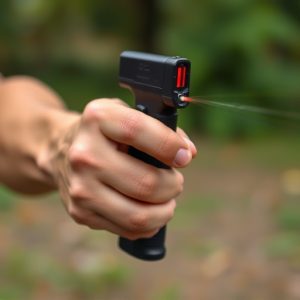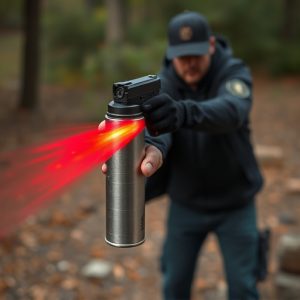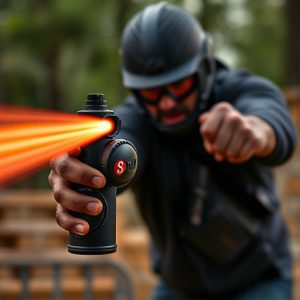Altitude Effects on Pepper Spray: Understanding Performance at High Elevations
Altitude significantly affects the performance of pepper spray, reducing range and potency at higher…….
Altitude significantly affects the performance of pepper spray, reducing range and potency at higher elevations due to thinner air. To counteract this, users in high-altitude areas should invest in specialized pepper spray designed for such conditions. Legal regulations vary by region, emphasizing responsible use through rigorous testing and clear labeling. When choosing a pepper spray, consider active ingredient concentration, stream pattern, weather conditions, and altitude to ensure optimal effectiveness.
“Discover the power of civilian defense pepper spray, a crucial tool for personal safety. This comprehensive guide explores the science behind its active ingredients and how they create a temporary yet effective barrier against potential threats. We delve into the fascinating dynamics of altitude effects on spray performance, shedding light on why these factors matter.
Understanding regulatory frameworks and legal considerations is essential, especially when choosing the right pepper spray for optimal effectiveness. Get ready to navigate this self-defense arsenal with informed insights.”
- Understanding Pepper Spray: Active Ingredients and Mechanism of Action
- Altitude Effects: How High Altitudes Can Impact Pepper Spray Performance
- Regulatory Considerations and Legal Status of Civilian Defense Pepper Spray
- Choosing the Right Pepper Spray: Factors to Consider for Optimal Effectiveness
Understanding Pepper Spray: Active Ingredients and Mechanism of Action
Pepper spray, a civilian defense tool, contains capsaicin, the active ingredient derived from chili peppers. When sprayed, it irritates the eyes and respiratory system by binding to nerve endings, causing temporary disorientation and immobilization. This mechanism of action makes pepper spray an effective deterrent against potential threats.
Altitude, or high elevation, can impact the effectiveness of pepper spray. In lower-pressure environments, like at higher altitudes, the spray’s range and potency might be slightly reduced due to changes in atmospheric conditions. However, this does not diminish its overall utility for personal safety. Understanding these factors ensures users are well-prepared, regardless of their surroundings.
Altitude Effects: How High Altitudes Can Impact Pepper Spray Performance
In high altitudes, where oxygen levels are lower, pepper spray performance can be affected due to reduced atmospheric pressure. This impact is particularly notable for individuals who aren’t acclimatized to such environments. At higher elevations, air becomes thinner, making it harder for pepper spray particles to carry their punch effectively. The reduced pressure can cause the spray’s range and potency to diminish, as the active ingredients struggle to dissipate into the air as efficiently as they would at sea level.
This altitude effect is crucial to consider for outdoor activities or law enforcement operations in mountainous regions. It underscores the importance of choosing pepper spray products designed for high-altitude performance, ensuring their effectiveness in these challenging conditions. Users should be aware that standard spray patterns and distances might not hold up as expected, necessitating closer range applications and potentially a higher concentration of active ingredients to achieve the desired effect.
Regulatory Considerations and Legal Status of Civilian Defense Pepper Spray
When considering the legal status and regulatory landscape for civilian defense pepper spray, it’s crucial to understand the varying regulations across different regions. These rules are designed to balance personal safety with public safety, ensuring that individuals can protect themselves while mitigating the potential harm caused by such products. In many jurisdictions, pepper spray is classified as a less-lethal or non-lethal force option for self-defense, subject to specific restrictions and guidelines.
One significant factor influencing these regulations is altitude’s effect on pepper spray. As elevation increases, atmospheric pressure decreases, potentially impacting the concentration and effectiveness of capsaicin, the active ingredient in pepper spray. This consideration underscores the importance of product testing and certification to ensure consistent performance under diverse environmental conditions. Additionally, legal frameworks often mandate clear labeling, storage instructions, and age restrictions to guarantee responsible use and minimize risks associated with civilian defense pepper spray.
Choosing the Right Pepper Spray: Factors to Consider for Optimal Effectiveness
Choosing the right pepper spray involves considering several factors for optimal effectiveness. First, altitude plays a significant role in its performance. The lower the elevation, the more potent the spray tends to be due to reduced air pressure, which can enhance its irritant effect. However, extreme altitudes may diminish the spray’s range and intensity, affecting its reliability in high-mountain regions.
Other critical aspects include active ingredient concentration, range, and stream pattern. A higher capsaicin concentration generally delivers a more powerful punch, but it should be balanced with user comfort to avoid overwhelming the target. Stream patterns can vary from fog to straight streams; understanding your distance and situation will help select the most suitable option. Additionally, weather conditions, such as wind and temperature, must be considered to ensure the spray reaches its intended target effectively.
In understanding the effectiveness of pepper spray, especially in various altitudes, and selecting the appropriate civilian defense option, users can make informed decisions. By considering the active ingredients, altitude’s impact, legal regulations, and individual needs, individuals can choose a pepper spray that offers optimal protection. Staying informed about these factors ensures that you’re prepared for unexpected situations while adhering to relevant laws. Remember, knowing your rights and the capabilities of your chosen defense mechanism is key in ensuring personal safety.


